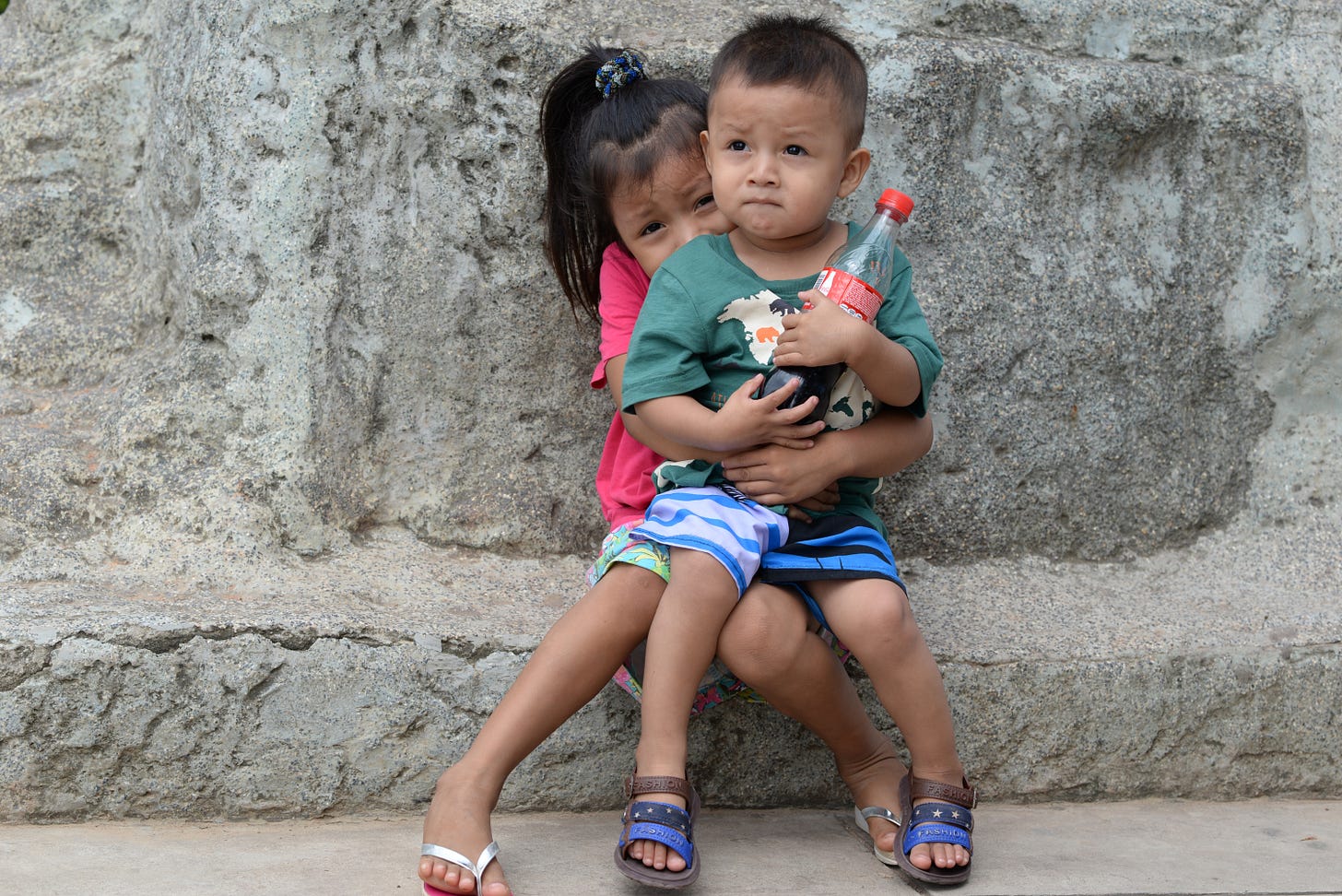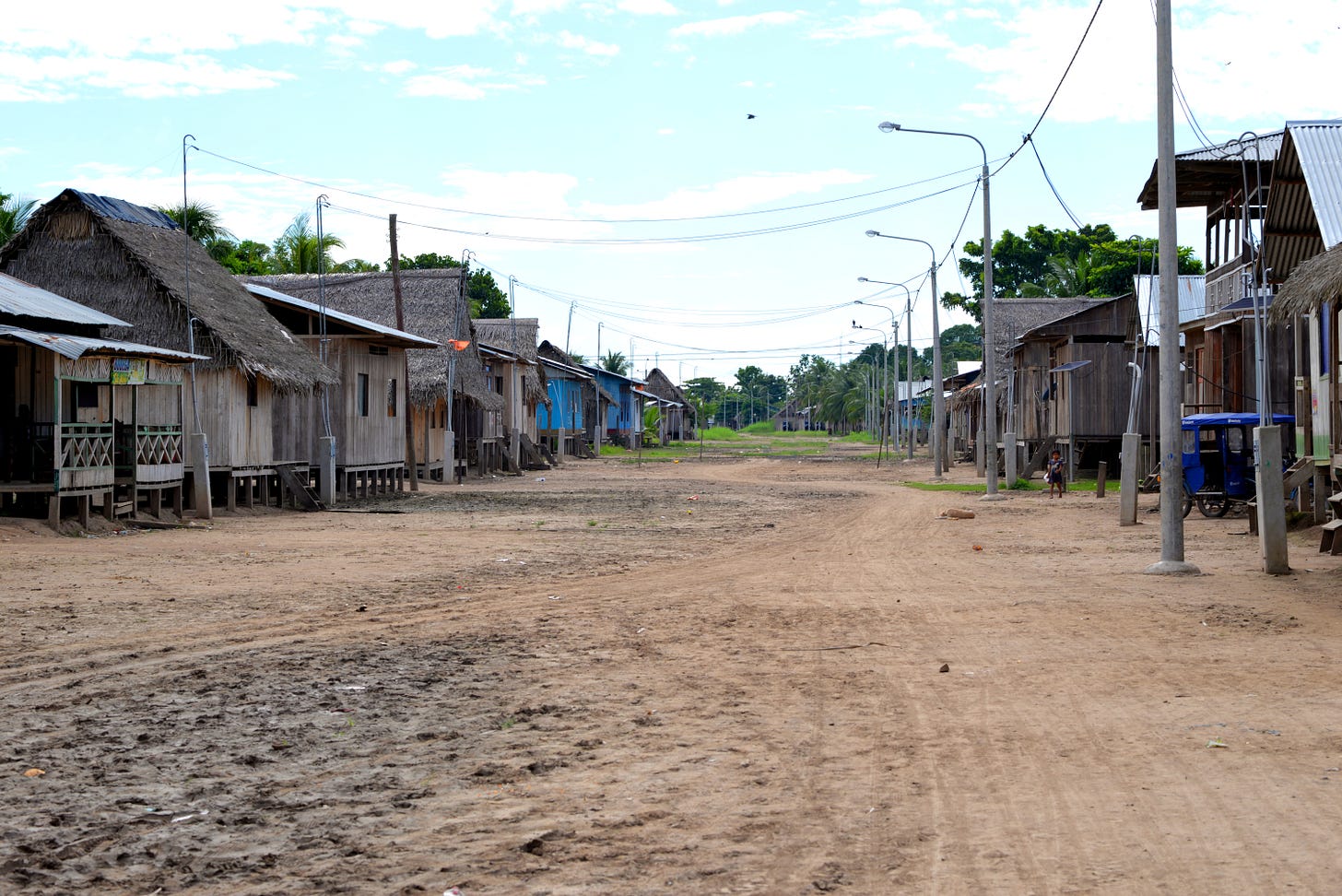“A war of the rich against the poor”
Interview with Magnolia and Wilson, an indigenous artist couple from the Shipibo group, about the effects of the Corona crisis in Peru
12/15/2020 | Ucayali, Peru. Peru was one of the countries in South America hardest hit by the Corona crisis. The Peruvian government relied on a “hard lockdown” oriented towards China, including a six-month curfew and extensive professional bans. “Soon more people will die of hunger than of Corona,” Wilson, an indigenous embroidery artist friend of mine from the Peruvian Amazon city of Yarinacocha, told me in August.
Magnolia and Wilson, how did the Corona crisis affect you in Peru?
From May to August we had many coronavirus cases and many deaths. Many people have died in my Yarinacocha ward, especially the elderly and people with diabetes. Above all, it hit the most vulnerable of us: people with previous illnesses, overweight, and too little money to be able to afford the expensive drugs. In May, the hospitals were overloaded and people died at the hospital entrances without care. Treatment on the ventilator costs 3,000 soles (700 €) — unaffordable for normal people like us. That is why so many died here. When Covid-19 started here, drug prices quadrupled overnight! There are now only a few cases, but still the strict rules in everyday life. Most of the people here have had enough of it by now. You know we’re not used to living like this! The people here don’t want to wear a mask anymore. In the past month I have not heard of a single corona death in my city of Yarina. People are no longer afraid of the virus; dengue fever is currently much more dangerous here.
Are there still curfews?
We are currently in the “targeted quarantine” phase, which will be decided separately depending on the region. Here in my Ucayali region, for example, there are very few cases, which is why we are allowed to leave the house between 4 a.m. and 10 p.m. At night, however, there is a curfew. In areas with more cases than here, curfew starts at 6 p.m. One person per family is only allowed to go out there on Mondays, Wednesdays or Fridays to do the shopping. In addition, the temperature is measured at all entrances to shops, from 38 ° C you are not allowed in anywhere.
You drive a mototaxi for work and have been banned from working for months. Can you work again in the meantime?
Not at the moment, as I first have to get new Corona documents and adapt my vehicle to the new requirements: a plastic partition between the driver and the customer and a sign about the mandatory mask requirement. If the police come across someone without all of that, the vehicle will be taken away and a heavy fine will be due, currently 4,000 soles (approx. € 900).
Did the government support you financially during the lockdown and ban?
No. The government announced support for the very poor — but only for those who, in the eyes of the government, represent the very poor. These received per family twice a sum of 360 soles (approx. 80 €). We were already happy, after all we are poor! So we submitted our application, but it was rejected because a government agency here in Yarina carried out a census five years ago. Back then you asked a lot of questions about our ownership structure: Do you have a television? Do you have a kitchen with a gas stove? You wrote everything down exactly. Also that we have a small coconut tree in the courtyard. They passed this data on to the application authority. We received the answer from the authorities that the “socio-economic test” had shown that we are not poor and that we are therefore not entitled to any state support during the ban on working. That was also written in it: “no pobre — not poor”.
And I suppose there are only rich neighbors in your area.
Exactly, we Shipibos here in the suburb of Yarinacocha are all rich! (laughs bitterly) That was one of the saddest things that almost no one of the Shipibos in my area received government support. We are still not poor enough for them. Here in Peru you have to live in a mud hut or sleep on the bare ground to be needy in the eyes of our government. And now comes the worst: many civil servants, mayors and the like, who are already well paid anyway, have simply pocketed the 360 Soles!
How did you feed your family during the crisis?
My uncle and I worked on a corn plantation four hours away by car. There they paid us 35 soles a day — from 7 a.m. to 5 p.m. on the plantation. That’s a lot of work for little money, and you’re away from your family all week.
How will it go on now? Is the corona vaccination coming?
The Peruvian government announced that it would carry out millions of corona vaccinations for January and February. They tell us that this vaccination will not be compulsory. But indirectly it is indeed mandatory — for anyone who wants to go back to work, travel, go to hospital or pick up their children from school. But at the same time they tell you that it is not compulsory.
Do the children also have to be vaccinated against Covid?
Yes, if the children want to go back to school, they have to get vaccinated against Covid-19. We are all very scared of it. In addition, the mask requirement should also apply in class next year! The children were not in school from the beginning of May to the end of November and were only allowed to move within a radius of 500m around our house. They received instructional videos on their cell phones. Many children felt very bad during this time, they had depression. Nobody here wants vaccinations for children, but we have no choice. We are blackmailed with their education and their welfare.
Do you think that claiming voluntariness could be a legal ploy to avoid liability for any damage?
Certainly! A well-known journalist recently said to our health minister that we citizens of Peru, who are now being urged to be vaccinated, first want to see how the entire government apparatus, all ministers and authorities get vaccinated! Let them lead by example in their function as representatives of the people! We don’t want to have this vaccination before that either.
All over the world there are currently large demos against the corona measures, in Argentina the lockdown was recently ended as a result of violent civil protests. How is the situation in Peru?
There are not yet any demonstrations against the corona policy in this country, but there are demos. The main topic is the rampant corruption — with which Corona is of course also connected! Perhaps it is also because the vaccination is not yet imminent, it will not come until January or February. We’ll see what happens then. Most of the people here are against the vaccination. Word gets around that it is not particularly efficient and that it is even supposed to change DNA. Many people here believe that everything was planned well in advance. That the vaccination was practically finished long in advance. They just want us to believe that they made the vaccine at an exceptional rate, but in reality it was already there. We’re not so stupid as to believe everything. In a crisis like this, the poorest of the poor are always the first to die. I believe this is a war.
In which sense, a war?
A war between the rich and the poor. Many people here believe that this virus was created to wipe out the poorest of the poor. The profit that arises from this goes to the big pharmaceutical companies. In the eyes of the rich, we poor are only unnecessary consumers; we are superfluous for them. They want to get rid of us.
My journalistic work is independent and funded exclusively by my readers.
Thank you so much for your support!
Bank details:
Recipient: Aya Velazquez
IBAN: DE70 1005 0000 0191 5576 92
BIC: BELADEBEXXX / BSK 1818 AG
PayPal: aya.velazquez@protonmail.com
Bitcoin: bc1qwmdx6cn5ska80l8gwv7ywx3tz2h5v2xe4acpas



